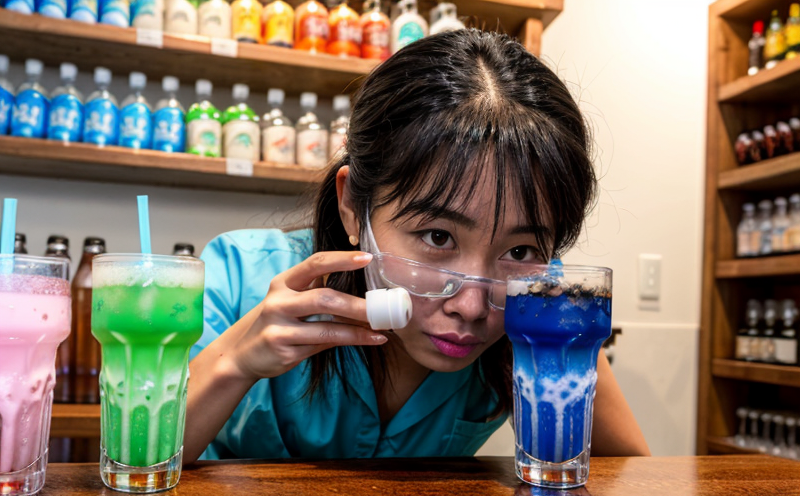EN ISO 16654 E. coli O157:H7 Detection in Beverages
The detection and quantification of E. coli O157:H7 is critical for the safety and quality assurance of beverages, particularly those with raw or minimally processed ingredients. This standard, EN ISO 16654, provides a robust framework to ensure that food products meet strict microbiological standards set by international authorities.
The significance of this service cannot be overstated, especially in the context of global beverage production and distribution. The presence of E. coli O157:H7 can lead to severe health issues, including hemolytic uremic syndrome (HUS) and other gastrointestinal disorders. Therefore, ensuring compliance with international standards is not just a best practice but a regulatory requirement.
The methodology outlined in EN ISO 16654 involves several key steps:
- Sampling of the beverage according to specified guidelines
- Preparation and inoculation into selective media
- Cultivation under controlled conditions
- Confirmation tests using biochemical methods or serological techniques
The selection of appropriate sampling locations is critical to ensure that the sample accurately represents the batch being tested. This process typically involves taking multiple samples from different parts of a single batch, which are then combined for analysis.
Once collected, the samples undergo preparation steps such as dilution and inoculation into selective media like MacConkey agar or XLT4 agar supplemented with tellurite. These medias allow for the isolation of E. coli O157:H7 from a complex background flora.
The next step is cultivation, where samples are incubated under specific conditions to enhance the growth of target organisms. This phase requires precise temperature control and time intervals to ensure optimal bacterial proliferation without contamination.
Confirmation tests are essential to differentiate E. coli O157:H7 from other strains that may have similar characteristics but do not cause illness. These tests can include biochemical reactions, serological methods, or PCR-based approaches. The use of these advanced techniques ensures high specificity and sensitivity in detecting the pathogen.
Compliance with EN ISO 16654 is essential for maintaining consumer confidence and ensuring regulatory compliance. Non-compliance can lead to product recalls, legal action, and significant financial losses. By adhering to this standard, manufacturers not only protect public health but also enhance their reputation in the marketplace.
The importance of this service extends beyond mere compliance; it plays a pivotal role in safeguarding public health and brand integrity. Regular testing helps identify potential issues early, allowing for corrective actions before they escalate into major incidents.
Applied Standards
The primary standard used in this service is EN ISO 16654:2013, which provides detailed procedures for the detection and enumeration of E. coli O157:H7 in beverages. This international standard is widely recognized and accepted by regulatory bodies worldwide.
Additionally, this methodology aligns with other relevant standards such as:
- ASTM D7860 for microbiological testing
- ISO 21528-4:2013, which covers the enumeration of coliform bacteria in foods
- US FDA's Code of Federal Regulations (CFR) Title 21, Part 110, Current Good Manufacturing Practice in Manufacturing, Processing, Packing and Holding Food for Human or Animal Consumption
The alignment with these standards ensures that the testing process is consistent across different jurisdictions and meets the highest global regulatory expectations.
Customer Impact and Satisfaction
Our clients benefit from this service by gaining access to highly accurate and reliable data, which can significantly impact their operations. The insights derived from this testing allow for proactive measures that enhance product safety and quality.
For quality managers and compliance officers, the ability to demonstrate adherence to international standards offers peace of mind and reduces the risk of legal challenges. This service also supports R&D engineers in refining production processes and optimizing ingredient selection.
In terms of procurement, this service ensures that suppliers meet stringent hygiene and safety criteria, thereby reducing the likelihood of contaminated products reaching market shelves.
Customer satisfaction is further enhanced by our commitment to continuous improvement. We regularly update our protocols to incorporate advancements in microbiology and technology, ensuring that we remain at the forefront of industry best practices.
International Acceptance and Recognition
The methodology described in EN ISO 16654 is widely accepted and recognized by regulatory bodies across the globe. This standard ensures that testing results are consistent, reproducible, and comparable internationally.
Countries like the United States, European Union member states, Australia, New Zealand, and many others have adopted this standard as part of their food safety regulations. This broad acceptance enhances trust in the global beverage industry and facilitates trade between nations.





